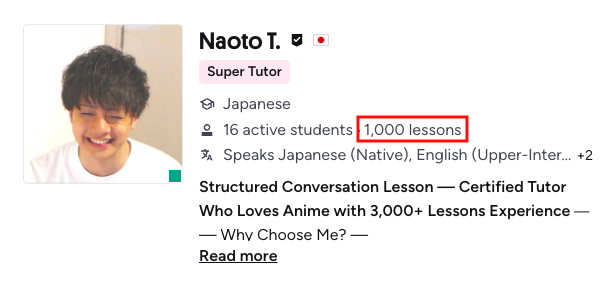It has been over two years since I started working as a Japanese tutor on Preply. I’ve been going at my own pace, but around six months ago my total number of lessons passed 1,000.

Just last week, it went over 1,500 (I forgot to take a screenshot.)
Reaching a four-digit lesson count on one platform feels like a big milestone and gives a sense of credibility as a tutor. I am truly grateful to the students who found me and chose to learn with me when my lesson count was still small.
In this post, I would like to share where I am now and what I plan to do next.
Finished Creating My Beginner Materials
I finally finished creating my beginner-level teaching materials. It took me more than two and a half years to complete them. Creating beginner materials was especially challenging because it required a lot of illustrations and translations.
Intermediate and advanced materials take much less time to make since they are mostly text-based. Each beginner lesson, however, took about three times as much effort.
For the past two and a half years, making beginner lessons had become part of my daily routine. Now that I have finished them, I have more free time, but I also feel a little empty, as if something that shaped my everyday life has come to an end.
It was really enjoyable to think about how to make each lesson easier to learn, easier to understand, and more engaging. Writing my own grammar explanations and conjugation charts helped me organize my knowledge of Japanese grammar. The saying “Teaching is learning” really proved true for me, because creating my own materials helped me grow as a tutor.
Even though I enjoyed the process, it is true that I could not do many of the other things I wanted to do because I was spending so much time and energy on lesson preparation.
The hardest part of being a freelance language teacher is definitely preparing lessons, which often means creating materials from scratch. I usually spent about three hours preparing for each 50-minute lesson.
It was not mentally exhausting since I often worked while listening to music or relaxing at a cafe with coffee, but I hardly had any free time left for myself. From now on, I would like to spend more time doing the things I have wanted to do.
There is still plenty of work to do, such as improving the materials and creating translations in other languages, but completing the full beginner series feels like a huge accomplishment.
What I Want to Do Next
Relearning English
First, I want to review and improve my English. My conversational English is fine, but sometimes I do not understand the advanced words my learners use. For example, I didn’t know the word “concussion” the other day.
During lessons I mostly speak in Japanese, and my learners probably do not expect me to know every complex English term. Still, I want to improve my English so they can take my lessons more comfortably and without stress.
Relearning Chinese
Next, I want to study Chinese again. I have not had many chances to speak Chinese for a long time since most of my Preply learners have been from Western countries. Recently, I have had more Chinese students and realized how much I have forgotten Chinese. I feel the need to relearn it.
For Japanese people, studying Chinese deepens their understanding of Japanese, especially when it comes to kanji. There are many interesting discoveries, such as old Chinese characters that still exist in Japan but not in modern China, or kanji that are used only in Japanese.
Just the other day, there was a discussion on X about the difference between the Japanese words “扶持(fuchi)” and “俸禄(hōroku).” By looking them up in Chinese dictionaries, I was able to understand the difference much more clearly.
「扶持」と「俸禄」の違いについて、嵯峨良さんが『信長公記』の用例をまとめてくれています。面白い。
ちなみに、中国語だとそれぞれの意味が明確に異なっていました。原義を確認する上で参考になるかもしれません。
Translation:
Sagara has put together examples from “Shinchō Kōki (The Chronicle of Lord Nobunaga)” illustrating the difference between “fuchi” and “hōroku.” It’s really interesting.By the way, in Chinese the two terms have clearly different meanings. It might be helpful for understanding their original sense.
https://x.com/japanese_naoto/status/1980042891465720164
Japanese people tend to think of both words as meaning “salaries paid to bushi or samurai,” but originally they had distinct meanings.
- 扶持 (fuchi): to help or support (later came to mean “allowance” in Japan)
- 俸禄 (hōroku): stipend for government officials
We found that “扶持 (fuchi)” could even be given to dogs, and the term was also used for in-kind aid to a homeless, which shows that it was different from “俸禄 (hōroku),” a more institutional form of salary.
English also has other similar words more such as “wage” and “salary,” which come from French and Latin. When English speakers study French or Latin, they gain a deeper understanding of English itself. The same is true for Japanese speakers who study Chinese.
Publishing My Research on Yasuke
Along with my teaching, I have been working on my research about Yasuke, and it has now become a massive collection.
At first, I was just translating what other Japanese people had already compiled into English and posting it on this blog. Over time, my interest grew, and I began visiting libraries to gather materials myself.
There are still many findings that I have not translated into English yet. Now that I finally have more time, I plan to continue translating them.
My articles are not organized chronologically or systematically because I have been researching in fragments. I would like to organize everything and publish it in some form.
I Want to Have a Hedgehog
I absolutely love hedgehogs. The hedgehog in my X icon is the one I saw at a hedgehog cafe. He is perfectly round and unbelievably cute.

I’ve always wanted to have a hedgehog once I had enough time and stability in my life. I’ve already picked out the cage I want and could welcome one into my home anytime. But I’m hesitant to get a baby hedgehog during Japan’s cold winter. I’ll wait until it gets warmer.
Wrapping Up: Praising Myself for Keeping It Up
When I first decided to create all my teaching materials from scratch, I was not sure I could do it. I worried that I might burn out along the way, but I managed to complete all the beginner materials.
In language learning, the most important thing is consistency. Unlike math or music, which often rely on talent, anyone can improve their language skills as long as they keep going. If you stop, you will forget.
Working on my beginner materials for two and a half years and finishing them gave me strong confidence that I can continue anything once I set my mind to it.
I am also deeply grateful to my long-term learners. Having to prepare new lessons before each class created a healthy kind of pressure that kept me moving forward.
Some of my learners have been studying with me for more than two years. One of them started as a complete beginner. At first, we used some English in our conversations, but now we speak almost entirely in Japanese.
As adults, our lives suddenly get busy and circumstances often change, which makes it hard to maintain a steady study pace. I truly admire people who keep learning despite those challenges.
I want to keep learning myself, too!


